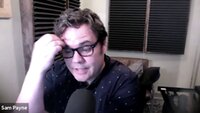| Title |
Payne, Sam OH26_003 |
| Creator |
Weber State University, Stewart Library: Oral History Program |
| Contributors |
Payne, Sam, Interviewee; Harris, Kandice, Interviewer and Video Technician |
| Collection Name |
Storytelling Festival Oral Histories |
| Description |
The WSU Storytelling Festival was implemented by the Friends of the Stewart Library in 1992. The library sponsored and managed the annual festival until 1998, when the festival was moved to the Department of Teacher Education, with the Library continuing as a sponsor. The three-day festival entails storytellers from all over the nation, including youth storytellers. The events are made up of workshops and presentations, a fund-raising banquet, and a wrap-up of wonderful stories from gifted performers. |
| Abstract |
The following is an oral history interview with Sam Payne, conducted on March 18, 2021, by Kandice Harris, via Zoom. Sam discusses his life, his career as a storyteller, and his memories of the Weber State University Storytelling Festival.; The following is a video clip of an oral history interview with Sam Payne, conducted on March 18, 2021, via Zoom Communications Platform, by Kandice Harris. In this video clip, Sam describes how anyone can be a storyteller and examples of the unconventional places people are participating in storytelling. |
| Image Captions |
Sam Payne 18 March 2021; Sam Payne speaking about the unconventional places people are participating in storytelling. |
| Subject |
Ogden (Utah)--Maps; Storytelling; Storytelling festivals; Digital Storytelling; Storytelling--United States; COVID-19 Pandemic, 2020- |
| Keywords |
Professional storytellers; Weber State University; Virtual storytelling |
| Digital Publisher |
Stewart Library, Weber State University, Ogden, Utah, USA |
| Date |
2021 |
| Temporal Coverage |
1996; 1997; 1998; 1999; 2000; 2001; 2002; 2003; 2004; 2005; 2006; 2007; 2008; 2009; 2010; 2011; 2012; 2013; 2014; 2015; 2016; 2017; 2018; 2019; 2020; 2021 |
| Medium |
oral histories (literary genre) |
| Spatial Coverage |
Ogden, Weber, Utah, United States, https://sws.geonames.org/5779206, 41.223, -111.97383; Jonesborough, Washington, Tennessee, United States, https://sws.geonames.org/4633848, 36.29427, -82.47348 |
| Type |
Text; Image/StillImage; Image/MovingImage |
| Access Extent |
16 page PDF; Video clip is an mp4 file, 149 MB |
| Conversion Specifications |
Filmed and recorded using Zoom Communications platform. Transcribed using otranscribe.com. |
| Language |
eng |
| Rights |
Materials may be used for non-profit and educational purposes, please credit University Archives; Weber State University; Background music for the opening of the video clip was downloaded from https://uppbeat.io/t/sky-toes/the-long-ride-home; License Code SHMYB9XWFGM8KLVU; Background music for the closing of the video clip was downloaded from https://uppbeat.io/t/yeti-music/gentle-breeze; License Code IWGKRYG7XHQOMZY0 |
| Source |
Payne, Sam OH26_003 Weber State University Archives |
| Format |
application/pdf; video/mp4 |
| ARK |
ark:/87278/s6684rj9 |
| Setname |
wsu_sf |
| ID |
111923 |
| Reference URL |
https://digital.weber.edu/ark:/87278/s6684rj9 |
| Title |
Payne, Sam OH26_003 |
| Creator |
Weber State University, Stewart Library: Oral History Program |
| Contributors |
Payne, Sam, Interviewee; Harris, Kandice, Interviewer and Video Technician |
| Description |
The WSU Storytelling Festival was implemented by the Friends of the Stewart Library in 1992. The library sponsored and managed the annual festival until 1998, when the festival was moved to the Department of Teacher Education, with the Library continuing as a sponsor. The three-day festival entails storytellers from all over the nation, including youth storytellers. The events are made up of workshops and presentations, a fund-raising banquet, and a wrap-up of wonderful stories from gifted performers. |
| Abstract |
The following is an oral history interview with Sam Payne, conducted on March 18, 2021, by Kandice Harris, via Zoom. Sam discusses his life, his career as a storyteller, and his memories of the Weber State University Storytelling Festival. |
| Image Captions |
Sam Payne 18 March 2021 |
| Subject |
Ogden (Utah)--Maps; Storytelling; Storytelling festivals; Digital Storytelling; Storytelling--United States; COVID-19 Pandemic, 2020- |
| Keywords |
Professional storytellers; Weber State University; Virtual storytelling |
| Digital Publisher |
Stewart Library, Weber State University, Ogden, Utah, USA |
| Temporal Coverage |
1996; 1997; 1998; 1999; 2000; 2001; 2002; 2003; 2004; 2005; 2006; 2007; 2008; 2009; 2010; 2011; 2012; 2013; 2014; 2015; 2016; 2017; 2018; 2019; 2020; 2021 |
| Medium |
oral histories (literary genre) |
| Spatial Coverage |
Ogden, Weber, Utah, United States, https://sws.geonames.org/5779206, 41.223, -111.97383; Jonesborough, Washington, Tennessee, United States, https://sws.geonames.org/4633848, 36.29427, -82.47348 |
| Type |
Text; Image/StillImage |
| Access Extent |
16 page PDF |
| Language |
eng |
| Rights |
Materials may be used for non-profit and educational purposes, please credit University Archives; Weber State University |
| Source |
Payne, Sam OH26_003 Weber State University Archives |
| Format |
application/pdf |
| Setname |
wsu_sf |
| ID |
111968 |
| Reference URL |
https://digital.weber.edu/ark:/87278/s6684rj9/111968 |





